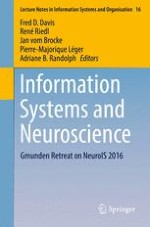2017 | OriginalPaper | Buchkapitel
Helping an Old Workforce Interact with Modern IT: A NeuroIS Approach to Understanding Technostress and Technology Use in Older Workers
verfasst von : Stefan Tams, Kevin Hill
Erschienen in: Information Systems and Neuroscience
Aktivieren Sie unsere intelligente Suche, um passende Fachinhalte oder Patente zu finden.
Wählen Sie Textabschnitte aus um mit Künstlicher Intelligenz passenden Patente zu finden. powered by
Markieren Sie Textabschnitte, um KI-gestützt weitere passende Inhalte zu finden. powered by
